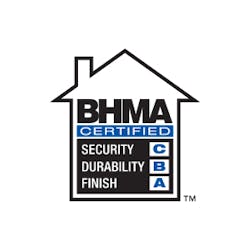BHMA Certified Secure Home™ Label Raises the Standard for Residential Door Hardware
While it may seem like it, selecting door hardware for a specific project is anything but simple. It requires several considerations, including the type of door (interior or exterior), frequency of usage, aesthetic preferences, security needs, traffic flow, and type of climate, among others.
Perhaps the greatest consideration when selecting door hardware, however, is the type of building, as the requirements and needs of commercial buildings vary greatly from those of – say – family homes. Recognizing this fact, the Builders Hardware Manufacturer’s Association (BHMA)—nationally recognized for its leadership role in certifying commercial hardware— separated the requirements for residential locks and deadbolts in 2015 with the publication of its first residential standards for builders hardware: ANSI/BHMA A156.39 Residential Locksets and Latches and ANSI/BHMA A156.40 Residential Deadbolts. Both standards establish performance requirements for products used in single and multifamily homes and include tests for durability, security and finish.
While the original standard, ANSI/BHMA A156.2 Bored & Preassembled Locks and Latches were used to cover the requirements for residential hardware to a certain degree, the A156.39 and A156.40 make the distinction between each application much more clear, and allow BHMA to set the highest possible requirements for commercial products and residential products, respectively.
Certified residential locksets and deadbolts can be identified by the BHMA Certified Secure Home™ label, which is affixed to the product’s individual packaging. The BHMA Certified Secure Home™ label indicates that the lockset or deadbolt has been rigorously tested to the highest performance standards for security, durability and finish.
Security tests determine how strong the hardware is, and make sure that it is capable of withstanding excessive forces or impact related to abuse or break-ins. Durability tests, on the other hand, measure how well the lockset or deadbolt functions after repeated use, over time. Lastly, finish tests measure how well the coating of the product can withstand exposure to certain elements or environments – such as salt water or UV rays. Testing requires that each product be subject to progressive levels of performance requirements in each of these areas, which are outlined in its respective standard. Based on the product’s performance during testing, it is then rated in each category on a scale of C (Good), B (Better) or A (Best).
The BHMA Certified Secure Home label provides extra guidance for manufacturers, contractors, builders, architects and other trade professionals involved in residential building when it comes to selecting the hardware best suited for each individual project. Those looking to install interior locks , for example, will find it much easier to “eliminate” locks that might be better suited for exterior use based on their security, durability and finish ratings combinations. In selecting products that bear this label, trade professionals and consumers alike, can rest assured knowing that they will perform to standard time and time again.
BHMA Certified Secure Home locksets and deadbolts can be found wherever hardware is sold. A full listing of BHMA Certified residential hardware can be found in the Certified Products Directory on the BHMA website – www.buildershardware.com. Any manufacturer can submit its lockset or deadbolt to a recognized independent third party laboratory to be tested for BHMA certification. However, only products that meet the performance requirements for security, durability or finish are able to be certified. The application for certification can be found on BHMA’s website, as well.
Although A156.39 and A156.40 are the only residential standards that have been published at this time, additional standards for other residential products such as hinges, thresholds, screen door holders and gaskets are expected to be developed in the near future.
Michael Tierney is Standards Coordinatorfor the Builders Hardware Manufacturers Association
